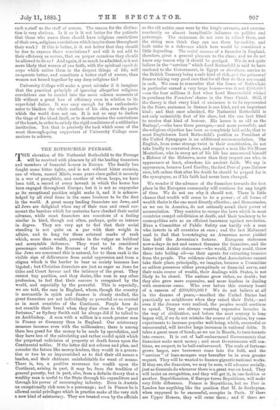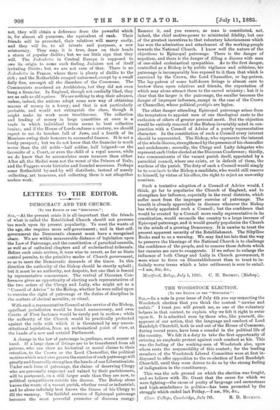THE ROTHSCHILD PEERAGE.
THE elevation of Sir Nathaniel Rothschild to the Peerage will be received with pleasure by all the leading financiers and members of financial houses in Europe. The family has fought some bitter fights, and is not without bitter enemies, one of whom, named Mires, some years since galled it severely in a war of pamphlets, and another of whom keeps, we have been told, a record of every lawsuit in which the house has been engaged throughout Europe; but it is not as unpopular as its exceptional position might make it, and it is acknow- ledged by all rival firms in the same business to be the first in the world. A great many leading financiers are Jews, and all Jews are delighted when any of their race and creed sur- mount the barriers which for centuries have checked their social advance, while most financiers are conscious of a feeling similar in kind, though not often, perhaps, quite so intense in degree. They are very apt to feel that their social standing is not quite on a par with their weight in affairs, and to long for those external marks of rank which, more than wealth, provoke in the vulgar an habitual and acceptable deference. They want to be considered personages outside the Bourses of the world. So far as the Jews are concerned this is natural, for to them rank is the visible sign of deliverance from social oppression and from a stigma which is the harder to bear as society becomes less bigoted ; but Christian financiers are just as eager as Jews for titles and Court favour and the intimacy of the great. They cannot buy position, and they desire, like men in any other profession, to feel that their success is recognised by the world, and especially by the powerful. This is especially, we are told, the case in England, where, though the country is mercantile in spirit and finance is closely studied, the great financiers are not individually so powerful or so courted as in most countries of the Continent. People here do not crumble their bread when they dine close to the "great fortunes," as Sydney Smith said he always did if he talked to an Archbishop. A man with a million is a much greater man in France or Germany than in England. Our aristocracy measure incomes even with the millionaires; there is among them less greed for the money to be made by speculation, and they have less of the calculating and rather sordid spirit which the perpetual redivision of property at death forces upon the Continental nobles. If the latter did not scheme and plan, and consider the future like money-lenders, they would in a genera- tion or two be so impoverished as to find their old names a burden, and their chtiteaux uninhabitable for want of means. There is, too, a positive reverence for wealth upon the Continent, arising in part, it may be, from the tradition of general poverty, but in part, also, from a definite theory that a wealthy man is useful to the State through his expenditure and through his power of encouraging industry. Even in Austria an exceptionally rich man is a personage ; and in France he is allowed social privileges which in practice make of the very rich a new kind of aristocracy. They are treated even by the officials as the old nobles once were by the king's servants, and exercise constantly an almost inexplicable influence on politics and patronage. The statesmen do not care to offend them, and the rising men think they can use them by.and-by, and both unite in a deference which here would be considered a little degrading. The social success of a financier in England, therefore, gives a general pleasure to the class ; and we do not know any reason why it should be grudged. We do not quite believe in the " services " which Lord Rothschild is said to have rendered to the Government, in Egypt or elsewhere, service to the British Treasury being a safe kind of risk, and the princes of finance taking very good care that for all they do they are repaid in cash. We seem to remember that the house of Rothschild in particular earned a very large bonus—was it not £1t30,000? —on the four millions it lent when Lord Beaconsfield wished to purchase the Founders' shares in the Suez Canal. Still, if the theory is that every kind of eminence is to be represented in the Peers, eminence in finance is one kind, and an important kind ; and that once admitted, Sir Nathaniel Rothschild is not only undeniably first of his class, but the one best fitted to receive that kind of honour. His house is as old as the Barings',—who have three peerages,—and more powerful ; and the religions objection has been so completely laid aside, that to most Englishmen Lord Rothschild's position as President of the United Synagogue is an additional recommendation. The English, from some strange twist in their constitution, do not take kindly to converted Jews, and respect a man like Sir Moses Montefiore, who in every act of his life has announced himself a Hebrew of the Hebrews, more than they respect one who, in appearance at least, abandons his ancient faith. We say in appearance, because Lord Eardley, the first Peer of pure Hebrew race, left orders that after his death he should be prayed fer in the synagogue, as if his faith had never been changed.
We wonder if the advance of the financiers towards the first place in the European community will continue for any length of time. We do not see why it should not. There is little chance that wealth will cease to be a power ; of all forms of wealth theirs is the one most directly effective; and Democracies, as we see in America, do not seriously assail their power of accumulation. They contrive to escape the laws which in most countries compel subdivision at death, and their tendency to be cosmopolitan acts as an efficient insurance against revolution. Even a Committee of Public Safety can hardly rob a man who, invests in all countries at once ; and the last Mahmond used to find that bowstringing an Armenian never yielded him half the Armenian's fortune. European statesmen now-a-days do not and cannot threaten the financiers, and the latter treat Asiatic statesmen—who would, if they could, throw them into boiling oil—as their agents for extracting treasure from the people. The evidence shows that Associations cannot take their place, principally, we imagine, because a Committee so seldom possesses either promptitude or financial nerve, and their main source of wealth, their dealings with States, is not likely to be closed. The nations grow richer, no doubt ; bat they also grow more expensive, and more fearless in dealing with enormous sums. Who ever before this century heard of a ransom of £200,000,000? We do not believe at all in the dreams of peace,—recollect the United States had practically no neighbours when they raised their Debt,—and even if the dreams were realised, the peoples would continue to spend. They are always wanting expensive luxuries in the way of civilisation, and before the next century is long begun will, if we do not mistake the course of opinion, try some experiments to increase popular well-being, which, successful or unsuccessful, will involve large increases in national debts. It takes a great mass of bonds, as we see in Russia, to turn tenants into owners. It is out of half-embarrassed Governments that financiers make most money ; and most Governments will con- tinue, we suspect, to be half-embarrassed. The scale of fortunes grows larger, new borrowers come into the field, and the " services " of loan-mongers may hereafter be in even greater request. They will be wanted to finance gigantic national works. If they are, the financiers, we may be sure, will advance socially, just as Generals do whenever there is a great war on hand. They will insist on recognition, and they will get it, in one fashion or another. Republicanism, if Europe turns Republican, will make very little difference. France is Republican, but no Peer in London has anything like the position that M. de Sonbeyran, when supposed to be successful, occupies in Paris. If there are Upper Houses, they will enter them ; and if there are
not, they will obtain a deference from the powerful which is, for almost all purposes, the equivalent of rank. Their Mends will be promoted, their relatives will marry easily, and they will be, to all intents and purposes, a new aristocracy. They may, it is true, draw on their heads a storm of popular dislike; but we see little sign that they will. The Judenhetze in Central Europe is supposed to owe its origin to some such feeling, Judaism not of itself irritating Deists; but we are not sure of that. There is no Tudenhetze in France, where there is plenty of dislike to the rich ; and the Rothschilds escaped unharmed, except by a small daily fine, amongst all the disorders of the Commune. The Communists murdered an Archbishop, but they did not even hang a financier. In England, though not cordially liked, they are as safe as old squires. We see nothing to stop their advance, unless, indeed, the nations adopt some new way of obtaining masses of money in a hurry; and that is not particularly probable, and would not extinguish the class, though it might make its work more troublesome. The collection and lending of money in large quantities at once is a trade in which individual brain seems to beat collective brains; and if the House of Lords endures a century, we should expect to see its benches full of Jews, and a fourth of its Members owing their honours to successful finance. It is not a lovely prospect; but we do not know that the financier is much worse than the old noble—half soldier, half brigand—or the favourite of a Court, or even the child of a royal amour, while we do know that he accumulates more treasure than either. After all, the Medici were not the worst of the Princes of Italy, and the Fuggers wrote histories and founded museums. Perhaps some Rothschild by-and-by will distribute, instead of merely collecting, art treasures, and collecting them is not altogether useless work.



































 Previous page
Previous page